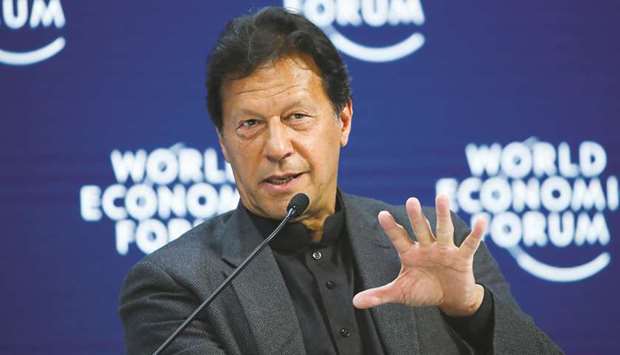Prime Minister Imran Khan has said that despite the coronavirus pandemic, the country’s economic indicators are improving to herald and paving way for an industrial Pakistan.
The coronavirus causes the Covid-19 respiratory disease.
In his message to nation on its 74th Independence Day, the prime minister said that no other country has managed to maintain a balance between saving lives and livelihood as had been accomplished by Pakistan.
Khan said that initially, the government had been concerned about deaths due to both the coronavirus and hunger caused by a lockdown.
However, thanks to the government’s decision of smart lockdowns, coronavirus cases are declining and the economy is on the path to revival.
Khan warned however that the war against coronavirus is not over, and that challenges remain.
The prime minister advised people to continue adhering to precautions of social distancing to avert a resurgence of the coronavirus.
He said that the uplift of the construction sector would benefit 40 connected industries to create jobs and wealth, which would consequently enhance the government’s tax collection.
Meanwhile, the cabinet’s Committee on the China Pakistan Economic Corridor (CPEC) has expressed satisfaction over the progress of CPEC projects.
The committee met in Islamabad, with Minister for Planning Asad Umar in the chair, and reviewed the progress of the CPEC.
Special Assistant to the Prime Minister on Information and Broadcasting Lt General (retired) Asim Saleem Bajwa briefed the committee about the progress of various CPEC projects being executed across the country.
Bajwa said that the officials from the relevant ministries reaffirmed their full commitment to accelerate work on the CPEC projects.
In a series of tweets, Umar said that the cabinet committee reviewed progress of CPEC projects during the financial year 2019-20.
He said that in the power sector, two projects with capacity of 1,980MW were commissioned, while the ground-breaking of another had been completed.
Similarly, the financial close of two projects was achieved and concession agreements of two hydel projects of 1,800MW capacity were signed.
China is to supply a coronavirus vaccine candidate being developed by a unit of the China National Pharmaceutical Group (Sinopharm) to Pakistan as part of a trial agreement, the Wall Street Journal reported.
State-owned Sinopharm is set to work with the University of Karachi on vaccine trials, according to the Wall Street Journal report, which said that Pakistan will receive enough doses early in distribution to vaccinate about one-fifth of its population.
The initial doses will be used to vaccinate the most vulnerable among the Pakistani population, including the elderly, healthcare workers and people with medical conditions associated with serious cases of Covid-19, the report added.
Earlier in April, Sinopharm had invited the National Institute of Health (NIH) Islamabad to collaborate in conducting clinical trials of its inactivated vaccine for Covid-19 in Pakistan.
In a letter sent to NIH executive director Major-General Dr Aamer Ikram, China Sinopharm International Corporation general manager Li Can had expressed the hope that “a successful clinical trial in Pakistan will make it one of [the] first few countries for the launch of a Covid-19 vaccine”.
Ikram had then said that although clearances were needed for the purpose, the collaboration could be “a great thing for Pakistan”.
Meanwhile, researchers have said that Sinopharm’s coronavirus vaccine candidate appeared to be safe and triggered antibody-based immune responses in early and mid-stage trials.
The candidate vaccine has already moved into a late-stage trial, one of a handful of candidates being tested on several thousand people to see if they are effective enough to win regulatory approval.
Sinopharm is also testing the potential vaccine in the United Arab Emirates in a Phase 3 trial expected to recruit 15,000 people, as China has too few new cases to be a useful trial site.
The potential vaccine did not cause any serious side effects, according to a paper published in the Journal of the American Medical Association (JAMA) by scientists who are part of Sinopharm and other China-based disease control authorities and research institutes.
The results were based on data from 320 healthy adults in Phase 1 and 2 trials.
The candidate vaccine triggered robust antibody responses in inoculated people, but it remains unknown if that is sufficient to prevent coronavirus infection, researchers developing the vaccine said in the paper.
Sinopharm’s chairman told state media last month that a potential vaccine could be ready by the end of this year, with Phase 3 testing expected to be completed in about three months.
The novel coronavirus, which has killed more than 750,000 people globally, has prompted a race to develop a vaccine.
More than 150 candidate vaccines are being developed and tested around the world.
Russia became the first country to grant regulatory approval to a vaccine after less than two months of human testing, and a shot developed by Chinese firm CanSino Bilogics has been cleared for use in the military.
China is leading the development of at least eight vaccine candidates in different stages of clinical trials.

Prime Minister Khan: no other country has managed to maintain a balance between saving lives and livelihood as had been accomplished by Pakistan.
